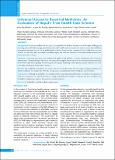Please use this identifier to cite or link to this item:
https://hdl.handle.net/20.500.14356/1583Full metadata record
| DC Field | Value | Language |
|---|---|---|
| dc.contributor.author | Adhikari, Shiva Raj | - |
| dc.contributor.author | Pandey, Achyut Raj | - |
| dc.contributor.author | Ghimire, Mamata | - |
| dc.contributor.author | Thapa, Arjun Kumar | - |
| dc.contributor.author | Lamsal, Dinesh Kumar | - |
| dc.date.accessioned | 2023-05-16T06:56:48Z | - |
| dc.date.available | 2023-05-16T06:56:48Z | - |
| dc.date.issued | 2018 | - |
| dc.identifier.citation | AdhikariS. R., PandeyA. R., GhimireM., ThapaA. K., & LamsalD. K. (2018). Universal Access to Essential Medicines: An Evaluation of Nepal’s Free Health Care Scheme. Journal of Nepal Health Research Council, 16(1), 36-42. https://doi.org/10.33314/jnhrc.v16i1.1105 | en_US |
| dc.identifier.issn | Print ISSN: 1727-5482; Online ISSN: 1999-6217 | - |
| dc.identifier.uri | http://103.69.126.140:8080/handle/20.500.14356/1583 | - |
| dc.description | Original Article | en_US |
| dc.description.abstract | Abstract Background: Access to medicine for the poor is recognized to be difficult task and one of the major challenges in achieving universal health coverage, particularly in low-and- middle income countries. In order to ensure the availability of essential medicines free of cost in public health facilities, Nepal has also commenced Free Health Care Services (FHCS). So, this study aims to evaluate availability, expiry, and stock-out duration of essential medicines at front line service providers in Nepal. Methods: Cross-sectional survey was conducted 28 public health facilities, 7 district warehouses, and 14 private pharmacies in 7 districts of Nepal. The survey was conducted during the March and April 2014. Survey tools recommended by the WHO operational package for assessing, monitoring and evaluating country pharmaceutical situations was used with slight modification as per Nepal’s situation. Results: The availability of medicine was found to be 92.44% in this study. The percentage of expired medicines in district warehouse was found to be 8.40. The average stock-out duration in district warehouse was 0.324 days. Conclusions: Although the availability of essential medicines at peripheral health facilities was found to be satisfactory with lesser proportion of expired medicines, a strong monitoring and evaluation of expired and stock medicines are desirable to maintain and improve the access to essential medicines. | en_US |
| dc.language.iso | en_US | en_US |
| dc.publisher | Nepal Health Research Council | en_US |
| dc.relation.ispartofseries | Jan - Mar 2018;1105 | - |
| dc.subject | Availability | en_US |
| dc.subject | Essential medicine | en_US |
| dc.subject | Expiry | en_US |
| dc.subject | Stock | en_US |
| dc.title | Universal Access to Essential Medicines: An Evaluation of Nepal’s Free Health Care Scheme | en_US |
| dc.type | Journal Article | en_US |
| local.journal.category | Original Article | - |
| Appears in Collections: | Vol. 16 No. 1 Issue 38 Jan-Mar 2018 | |
Files in This Item:
| File | Description | Size | Format | |
|---|---|---|---|---|
| 1105-Manuscript-3893-2-10-20180314.pdf | Full text Article | 270.98 kB | Adobe PDF |  View/Open |
Items in DSpace are protected by copyright, with all rights reserved, unless otherwise indicated.
